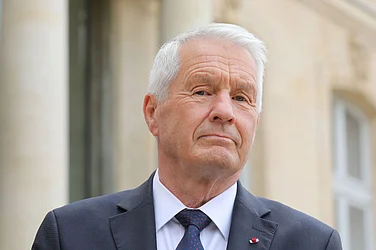The discovery of classified data from US President Joe Biden's former Think Tank office, which he frequently used after the end of his tenure as the vice president to the then US President Barrack Obama, has caused a stir in the media. Now with CBN reporting that a second round of classified files has also been discovered from a yet unknown but different location, Republicans have charged Biden with hypocrisy and questioned his document practices.
What are classified documents?
Wikipedia defines classified information as material deemed by a government to be sensitive information that must be protected. Access to such material is restricted by law or regulation to particular groups of people with the necessary security clearance and need to know, and mishandling of the material can incur criminal penalties.
A means of state secrecy, classified documents are marked by a series of specific acts, writes historian Sam Lebovic. These acts include the stamping of a document, the development of bureaucratic methods and logic of classification, and the enforcement of physical and legal protections against prying eyes. Therefore, making such documents integral to an institution's control over information.
The history of classified documents in the United States is remarkably short. The modern-day classification system was created in an executive order issued by the 33rd US President Harry Truman in September 1951. The order established three categories of documents: Top Secret, Secret, and Confidential, and laid rules and practices for classifying and securing information, which is still used to keep information secret.
A Legal or a political issue?
The issue of classified documents has been more political than legal. Politicians and office bearers have landed in trouble for the mishandling or unauthorized acquisitions of the documents and suffered politically than facing severe legal ramifications for the same. Classified documents have been the shortcut to controversies surrounding the white house in Washington for decades.
Political talk shows and ordinary American citizens have heard all about different classified documents leaking or manhandling over the years, and the recent Biden episode has only further sparked the general public's speculations.
The Clinton emails
The controversy surrounding classified information and her email server played a poignant role in shattering the presidential dreams of Democrat candidate, Hillary Clinton during the 2016 Presidential elections.
While years-long FBI investigations established that Clinton's server had no information or emails clearly marked classified during her tenure as the United States Secretary of State. Federal agencies in retrospect concluded that 100 emails shared by Clinton had information that should have been deemed as classified, including 65 "secret" and 22 "Top Secret" ones. Additional 2,093 emails were retroactively designated confidential by the State Department.
One of the many infamous episodes of Donald Trump
During a raid in August 2021, the FBI found scores of classified documents at ex-president Donald Trump's Mar-a-Lago residence in Florida, over a year after Trump's stint in the President's office. The former US President risked criminal charges by refusing to return top-secret records to the government despite multiple requests by the National Archives and Records Administration (NARA) after leaving the White House.
Trump left the office in a haphazard fashion after contending the 2020 election results leading to his defeat and brought boxes of government documents with him to Mar-a-Lago, his Florida resort. While Trump turned some of the documents over to the National Archives, responsible for presidential records, he refused to provide rest. Fearing national security secrets risk, the Justice Department obtained a search warrant and found more top-secret documents at the resort.
He eventually returned 15 boxes of materials back to NARA in January 2022 and is currently facing an investigation for potentially mishandling classified documents. A special counsel was appointed to determine whether any criminal charges should be filed in the case or a separate investigation into Trump’s attempts to cling to power on 6 January 2021, when a mob of his supporters attacked the US Capitol.
Trouble for Biden
After his term ended as the vice president for then-President Barack Obama, Biden periodically used the think tank office space from mid-2017 until the beginning of his 2020 presidential campaign. “People know I take classified documents or classified information seriously. When my lawyers were clearing out my office at the University of Pennsylvania, they set up an office for me, a secure office in the Capitol. The four years after being the Vice President, I was a professor at Penn,” Biden told reporters in Mexico City on the question of the discovery of Classified documents earlier.
Now, news of a second round of discovery of classified data by Biden's aides at a second location within 3 days has intensified Republican attacks on the president. Biden had called Trump's stint with the classified information irresponsible. He had said that hoarding sensitive documents at his (Trump's) estate in Florida was irresponsible.
Republicans revelled in the new disclosures, accusing Mr Biden of hypocrisy in calling former President Donald J. Trump irresponsible for hoarding sensitive documents at his private club and residence in Florida. This week, the new Republican chairman of the House oversight committee issued a far-ranging request to the National Archives and Records Administration, which is supposed to receive all highly sensitive materials after an administration leaves office, for documents and correspondence. However, in contrast, Biden's lawyers had voluntarily returned the documents to the archives in November while Trump had resisted the process. It is not clear if the archives had flagged the new materials, but the president has vowed his cooperation in the review proceedings.
Location or characteristics of the records re yer unknown. Biden’s aides have been scurrying to various places since November, when his lawyers discovered a handful of classified files, including briefing materials on foreign countries, as they closed the think tank office in Washington. The Justice Department is reviewing the discovery to determine further proceedings.


























